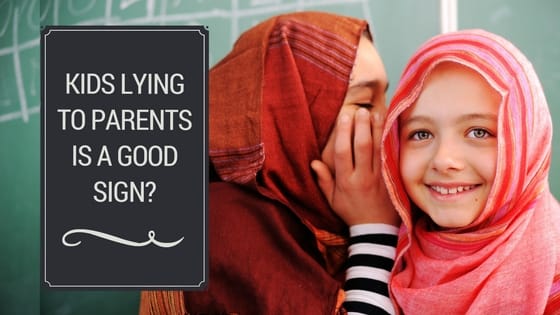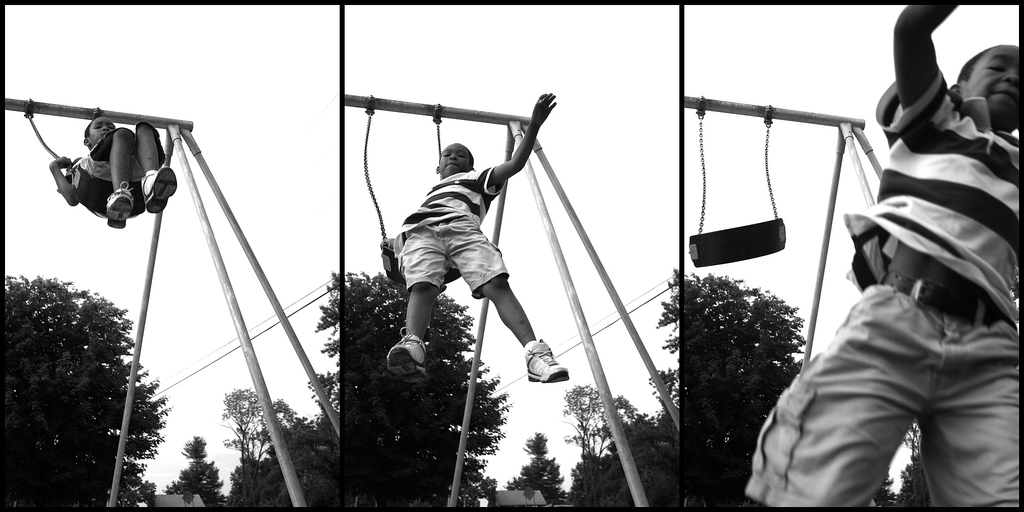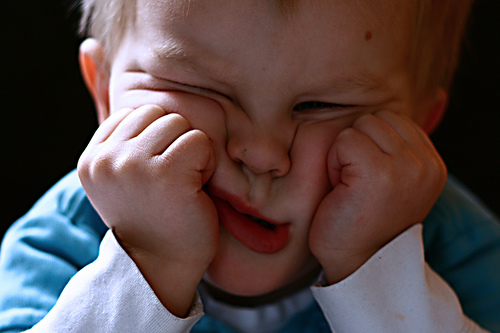Have you heard a child say…
“I have a horse in my backyard.” (When she doesn’t.)
“I didn’t hit him.” (When he really did.)
“I’ll turn off the computer after I finish this game.” (Then she doesn’t.)
Starting at 2 or 3 years of age kids start lying. Being lied to is something that parents universally dislike and many parents worry about.
What most parents don’t know is that lying is a really important developmental stage. And once you understand why kids lie and you know how to address it, then lying becomes something that you don’t need to worry as much.
Why do kids say things that aren’t true?
There are 3 main reasons why kids lie to their parents (we’ll address those next week), but first let’s look at child development and take a quick peek at social evolution to see why all humans lie.
To be human, is to lie
“Researchers speculate that lying… arose not long after the emergence of language. The ability to manipulate others without using physical force likely conferred an advantage,” says the June 2017 edition of National Geographic. Lying is an important evolutionary skill.
According to research done 20 years ago by Bella DePaul, a social psychologist at the University of California at Santa Barbara, the average adult lies 1-2 times per day. Many of these lies are relatively harmless. We might say “I’m late because of the traffic” rather than, “I’m late because I didn’t leave the house on time.”
Lying is an important developmental milestone
Kang Lee, a psychologist at the University of Toronto, sees lying as a positive sign of cognitive growth because in order to lie effectively a child must have a “theory of mind”–the child must understand the difference between his and someone else’s perspective. It’s a “theory of mind” that allows a child to put himself in someone else’s shoes, which is essential for empathy.
Two year olds who lied in Lee’s study also had higher levels of executive functioning–planning, attention, and self-control.
The same two year olds who had lied in Lee’s study–when they became 16–outperformed other teens in measures of executive functioning and theory of mind.
Who knew that kid’s lying can be a good sign? A child needs to have a quick and well developed brain to lie.
For most people, lying is common, but limited
If you worry about your children lying, here is another study that might reassure you. Dan Ariely studies lying in adults. His research discovered that most of us lie, but only a little bit.
In Ariely’s study, participants got money for each math problem they completed during a timed test. Many adults inflated their scores to get more money, but most only lied a little.
Ariely says, “We give people a chance to steal lots of money, and people cheat only a little bit. So something stops us–most of us–from lying all the way” because we want to see ourselves as honest people.
So now that we understand that lying is a developmental milestone and we can be reassured knowing that humans have a built-in limit to their lying, does that mean we just let kids lie to us? Nope.
As a parent or teacher, what do you do when a child lies?
Next week we’ll look at the 3 primary ways children lie and how you can handle it.
In part 2, we’ll address how to handle children “telling tall tales”, kids lying to avoid getting in trouble, and kids agreeing to something, but then not doing it.
In the comments, share a story about a child that lied to you. What did she say? And stay tuned for next week because we are talking about what to do when kids lie.










A lot of parents just stay confused about why their child lies. You really should confront them and ask them why. The answer might make you rethink how you’re raising your child. Big thanks to this article for bringing this to light.
i have three kids and they tell lies while joking. but i get scared because i always think it ll move from being a joke to being real. you guys are wonderful i must say.
Your kids, just like all kids and adults, will probably sometimes tell an untruth, but this is part of human development rather than something to be scared of!
Love the authentic content Happily Family continues to write and what an intriguing topic. Lying can really get under parents’ skin when they don’t take the time to look at the root cause. As with much in life, I suppose! Love the follow-up post too!
Since this particular post, I have not been able to get this post’s photo out of my head. The photo has triggered me and I suspect it is because of the cultural and age appropriation. I associate this picture to dressing up a girl from India as a Native American, or in a Mexican outfit with a sombero? And as little girl done up like a career woman. The age when Muslims start wearing the hijab is at puberty. The color doesn’t seem right either… “It is not permissible for a woman to go out in a decorated garment that attracts people’s gaze, because this is something that tempts men”. Anyways, I absolutely have loved all the content as it’s sooooo genuine and authentic. This picture just seems to attempt to check a “diversity” box without being genuine nor authentic. Perhaps there is another purpose that I’m missing. Thank you for all that you do and all that you are. Keep up the fantastic job and advice. It has really helped my brain-shift to being a better parent and communicator!
I’m so glad you like our blog posts. I agree with you that sometimes stock photos miss the mark. We do try to show diversity in our images. With readers in over 150 countries we choose images that reflect the diversity of our readers. Thanks for seeing the genuineness and the authenticity of our content, even when the stock photos don’t look as compelling.
If your kids don’t lie that’s wonderful, it should be celebrated, and it’s surely a sign of a close trusting relationship with you! Hats of to you, Sandy! In this article, the research I cite reported an association with lying and certain executive functions. It wouldn’t surprise me if their were also other areas of the brain that were better developed in kids who didn’t lie. I was hoping that this article would help parents to not worry as much about lying, I wasn’t intending to compare kids or to say that some kids are smarter than others.
We’ll address this more in Part 2. Stay tuned!
What is nice is that with lying the consequence–kids and adults not believing them–happens quite naturally without us having to intervene.
That’s a really interesting perspective, Vivek!
I like that you’ve said as parents “our role is to be a safe harbor”. :)
Oh my gosh, thank you for this. The timing couldn’t be more perfect!
Glad you liked it, Stoney!
I have no issues with lying with children. I believe its developmental. My issue is your argument that if your child is age 2 and “lying” they are higher functioning than other kids who may start later. I think what bothers me is that its about then I can pat myself on the back as whoo hoo my kids are smarter than other kids. Using the “compare and contrast” model. When the reality is all children lie. Whether you do at 2,34,5 or 6. Why does when they start matter? So if a child, like mine, “lies later” they must not have “higher functioning, attention and control and will be outperformed other kids at 16.”
I have a son. At the end of September he will be 5. The last 2 months are especially rich in lying. And I do not know what to do. He likes to brag when he is with other children and I am afraid that when they will find out the truth, then he will be in bad situation. That they will laugh at him. For example he would say “I have 10 of such cars at home”, “I have my own computer” and so on. He tries to impress others with his lying. And I am really worried that he does not feel strong enough to be interesting and valuable, that he tries to have “material wealth” to impose others. I am really at a lost how should I react.
Any advice?
Thank you.
That’s what we are talking about in Part 2. Stay tuned!
My son always says yes he picked up his clothes when he didn’t. I say- You did? (In a happy voice.). That’s awesome, I want to see! Then he says- don’t come see yet, and runs off to do it. Lying usually occurs when chores are not done in our house.
That’s a great approach… keeping things light, fun while also encouraging him to finish his chores! Well done, Becky!
I have a 13 year old who lies a lot. Will your advice advice help me, or does this only apply to young children?
We will talk about kids of all ages! Stay tuned!
My 5 years old daughter transforms the reality when she knows she didn’t make the right choice or did a mistake, even when she does it in front of us to see! ” i dind’t drop that” ” my friend played with all those toys in her room and she didn’t clean up ( when no one came over) ” it is not true, I didn’t hit him” during a fight with his brothers. This is happening for a while now and it doesn’t seem to get better. Usually I go with her story and we laught about the story making at the end and the true story comes out.
The lying trouble I have with my 2 sons, 8 and 10, is more about trusting their words about getting in bed on time, doing what they need to do at bed time on time, be reponsible for their chores. I wish to not have to be behind them as much and trusting they can “manage” their time.
Looking forward to read you next week!
Dear Carole!
Even adults in their jobs have supervisors! When we want a person to do things as we want them to do it, we will tend to go to micro-managing. When we can just see the bottom line, the end result, and we can leave room for the person to have autonomy of the “how to” then we don’t need to micro-manage. Hugs!
That’s what we’re going to talk about in Part 2! Stay tuned!
This is such a help! Thanks!
You’re welcome, Mary!
I am really looking forward to hearing your suggestions for how we best handle this development! One of my favorites was that our two year old would tell anyone who would listen that it was his birthday when his birthday was, in fact, nowhere in the countdown range. In his spare time he is apparently a tow truck driver. Thanks for normalizing this sometimes concerning new behavior!
Now you can rest assured that his development is normal!